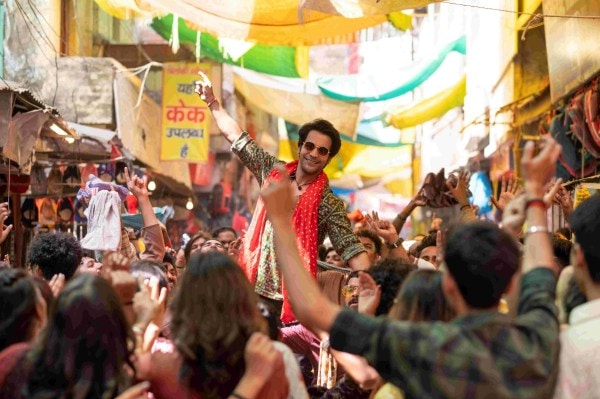Nobody is above being typecast, not even Shah Rukh Khan. But while the Badshah of Bollywood has broken hearts and weakened knees with his culture-defining romance movies, Rajkummar Rao has become the patron saint of losers. Far too many times in the last decade, the once-promising star has played versions of the same person: a small town layabout whose overwhelming uselessness is inexplicably presented as innocent charm. The secret behind these characters’ appeal is never revealed, nor does Rao play them as particularly irresistible. In fact, in most of these movies, not only are the protagonists indistinguishable from each other, they’re positively repulsive. Even Rao would’ve struggled to bring freshness to his performance in Bhool Chuk Maaf, the latest in this long line of films.
He plays a 25-year-old man named Ranjan in the supposedly ‘high-concept’ comedy. But his age is something we must live with; we can’t get annoyed in the first five minutes of the movie, can we? There are bigger problems to shake our fists at. So, we move on, reminding ourselves that it would’ve been even weirder if Rao was playing his real age. Because although Ranjan is old enough to vote and get married, he hasn’t ever bothered finding a job. This doesn’t sit right with his girlfriend’s dad, understandably so. All he wants is for Ranjan to find gainful employment before asking for his daughter’s hand in marriage.
Also read – Pokhar Ke Dunu Paar movie review: Poetic and profound, the best Hindi film of the year
 Rajkummar Rao in a still from Bhool Chuk Maaf.
Rajkummar Rao in a still from Bhool Chuk Maaf.
Left with no choice, Ranjan agrees. But instead of scouring through LinkedIn and giving an interview or two, he goes to a shady old man played by Sanjay Mishra, who claims to have connections in various government departments. For Rs 6 lakh, the old man promises Ranjan a government job within the two-month deadline that he has been given by his girlfriend’s dad. Ranjan arranges for the money by selling his mother’s jewellery against her knowledge. When his girlfriend — she’s played by Wamiqa Gabbi, by the way — offers to lend him some of her dowry, he pretends to be outraged, but agrees three seconds later. This is the guy we’re supposed to be rooting for. He doesn’t have a single redeeming quality. But for some reason, it’s characters like Ranjan that Rao gravitates towards these days. There’s nothing wrong with playing terrible people on screen, but it can become monotonous for the audience when an actor — especially someone of Rao’s talent — reduces themselves to a type. If Ranjan were to walk into one of his other movies, you wouldn’t even notice.
Barring a couple of films in which he played cops — Badhaai Do and Bheed — Rao’s been stuck doing the same small town schtick. In Stree, he plays a loafer who falls in love with a ghost lady. In Chhalaang, he’s barely able to secure work as a school PT teacher. In Shimla Mirchi, he stalks a woman in the hills because he has nothing else to do. In Roohi, he plays a kidnapper. Before you say anything, this isn’t a real job. In Guns & Gulaabs, he runs some kind of cycle repair shop; in Vicky Vidya Ka Woh Wala Video, he’s a mehendi artist who’s managed to get married to someone way out of his league; in Mr & Mrs Mahi, he’s forced to sit behind the counter of his dad’s sports store.

In each of these projects, Rao’s characters are barely-functional man-children. The only reason they find employment is because their love life relies on it. Mr & Mrs Mahi is probably the worst offender; not only is Rao’s character in it severely immature, he’s also rather rude to his angelic wife. He grooms her to give up on her dreams of becoming a doctor, all because he wants to live his fantasies vicariously through her. In a more sensible movie, she’d have knocked him over the head with his own hockey stick and walked out. Instead, Rao’s character is projected as some sort of valorous hero; a champion of women who empowers his wife to become a cricketer.
Bhool Chuk Maaf isn’t as well-made as either Bheed or Badhaai Do, two movies that understood that people live inside prisons of society’s making. Ranjan’s frustration manifests in horrible behaviour that the movie never fully addresses. Sure, he has a change of heart at the end, when he realises that he shouldn’t have stolen a job with someone else’s name on it. But what about his other faults? How about we address the entitlement that folks like him and Ajju bhaiyya from Bawaal walk around with? It was funny the first time, when he played a person like this in Bareilly Ki Barfi all those years ago, but that’s because his character in that film was genuinely endearing.
Story continues below this ad
Read more – Loveyapa: Junaid Khan plays the world’s biggest red flag again, this time in Advait Chandan’s outdated romantic comedy
 Wamiqa Gabbi in a still from Bhool Chuk Maaf.
Wamiqa Gabbi in a still from Bhool Chuk Maaf.
The unimaginative writing aside, Rao’s work in these movies itself is an issue. There’s a tendency to lean into the dialect, which often sounds interchangeable. There’s also a tendency to have outbursts; there’s a false sense of pride in these people, bordering on arrogance. Rao has a difficult time injecting them with vulnerabilities. These movies, including Bhool Chuk Maaf, leave no room for introspection and indecision. The men at their centre are empowered by the filmmakers to strut through life with a delusional overconfidence. Some movies, like Monica O My Darling, are smart enough to call their so-called hero out on their bashfulness. Others, like Srikanth, are too terrible to take seriously.
But there is a difference between creating complex characters and two-dimensional oafs. In Bhool Chuk Maaf, when Ranjan is terrible, he’s uniformly terrible. And when his redemption arc is complete, it’s as if his entire personality has changed. Neither version is particularly realistic, because most humans exist somewhere in the middle of this spectrum. Rao has played such characters many times in the past, in movies such as Shahid and Aligarh, in Trapped and Newton. It’s about time he returns to his roots, not for our sake, but his own.
Post Credits Scene is a column in which we dissect new releases every week, with particular focus on context, craft, and characters. Because there’s always something to fixate about once the dust has settled.


